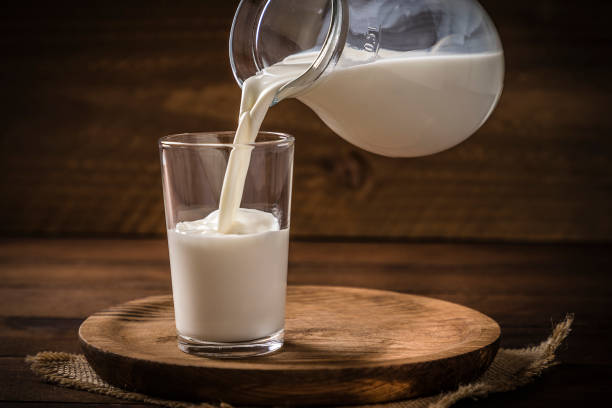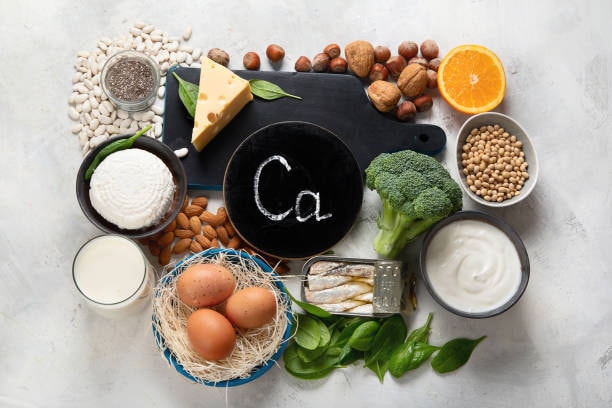
How Many Calories, Protein, and Calcium in 1 Glass of Milk?
Time to read 6 min
Time to read 6 min
Milk and dairy products are produced by mammals (mammary glands) including cows, buffaloes, goats, sheep, and humans but the most common milk we use is cow and buffalo milk. When it comes to calcium, what quickly comes to our minds is milk, an extremely nutritious and calcium-rich drink. The most common products made of milk are yogurt, butter, cream, and cheese however milk sugar is used to prepare several food items, sweets, and much more.
Now, you must be curious to know about the nutritional value of milk. So in this blog, we are going to talk about milk calories (1 glass of milk calories), calcium, and protein found in a glass of milk. Keep reading to explore the nutritional content of milk.
Drinking one cup of milk every day is an essential part of a balanced diet if you are not affected by lactose intolerance (lactose intolerant people). Consuming milk every day can reduce the risk of osteoporosis, obesity, metabolic syndrome, high blood pressure, lower blood pressure stroke, cardiovascular disease, and colorectal cancer.
The rich nutrient profile of milk, along with its fat content, includes calcium, protein, and Vitamin D making it a popular choice due to its fatty acids. Nutrients found in milk are essential for growth, bone health, and complete well-being. Additionally, milk also contains potassium, magnesium, phosphorus, and Vitamin B12.
You must have heard that drinking warm milk at night before you sleep can help you sleep better especially if you are lactose intolerant and feel difficult to sleep. According to experts, human breast milk and other milk types comprise Tryptophan, which is used by the body to produce brain chemicals Melatonin and Serotonin. These two chemicals are involved in various processes and one of them is to relax your body and prepare for sleep. For example, you can try warm milk with a little amount of honey before you go to bed and it will help you sleep easily and better.
The nutritional composition of milk, including plant-based milk, is extremely complex as regular milk contains almost all nutrients required by the body. The sugar content in milk varies depending on the type of milk and whether the sugar is added.
Cow Milk: Cow milk naturally contains sugar (lactose) content that is approximately 12 grams per cup.
Almond Milk: Typically unsweetened almond milk contains 0 grams of sugar per cup.
Soy Milk: Typically unsweetened soy milk contains approximately 9 grams of sugar per cup.
Oat Milk: Generally unsweetened oat milk contains around 7 grams of sugar per cup.
Rice Milk: Usually unsweetened rice milk contains approximately 12 grams of sugar per cup.
Flavored Milk: Various flavored milk such as chocolate milk contain added sugar that significantly enhances the sugar content.
Different types of milk contain different amounts of calories. We have mentioned the calorie content in different types of milk however how many calories may slightly vary depending on the brand, and additional nutrient values.
Cow Milk: A glass of cow milk contains around 150 calories.
Whole Milk: One cup of whole milk contains around 150 calories.
2% Milk: One glass of 2% milk contains around 125 calories.
Skim Milk (fat-free): One glass of skim milk contains approximately 80-85 calories.
Without Sugar: One glass of whole milk without added sugar contains around 122 calories.
With Sugar: One glass of whole milk contains approximately 140 calories and adding one spoon of sugar adds calories making the calorie value around 209.
Protein is essential for your muscles, bones, hair, and skin. A standard cup of milk contains around 8 grams of protein. The protein content found in milk is rich in essential amino acids (casein and whey) which are crucial for muscle growth and all bodily functions.
Whole Milk: One cup of whole milk contains around 8 grams of protein.
Skim Milk: One cup of skim milk contains around 8 grams of protein.
Soy Milk: One cup of soy milk contains around 7-8 grams of protein.
Almond Milk: One cup of almond milk contains around 1-2 grams of protein.
Rice Milk: One cup of rice milk contains around 1 gram of protein.
Oat Milk: One cup of oat milk contains around 3 grams of protein.
Generally, a standard glass of milk contains around 300 mg of calcium. The amount of calcium may slightly vary depending on the type of milk.
Whole Milk: One cup contains 300 mg of calcium.
Skim Milk: One cup contains 325 mg of calcium.
Almond Milk: One cup of unsweetened almond milk contains 300-483 mg of calcium.
Fortified Soy Milk: One cup contains 400-380 mg of calcium.
Non-fortified Soy Milk: One cup contains 26 mg of calcium.
Fortified Rice Milk: Unsweetened one cup contains 283-300 mg of Calcium.
Calcium, along with managing saturated fat intake, is extremely important for bone and teeth health. Your body also requires calcium for blood clot formation, muscle contraction, regulating heart rate, and efficient nerve signals. Healthcare professionals recommend everyday milk consumption for individuals (50 years and above) to promote strong bones and reduce their risk of developing osteoporosis, which affects bones making them less dense and thinner. Osteoporosis increases the risk of bone fractures in older adults.
The Recommended Dietary Allowance for calcium depends on the age and gender of the individual.
The exact nutritional value of milk and dairy products may vary depending on the type of milk. However, milk is a rich source of calcium, protein, and clinical nutrition with many essential vitamins and minerals including:
Milk is a common drink and it must be a part of your diet. It contains almost every nutrient your body needs. It helps you stay energized and protected against various diseases. The total value of calorie, fat, and sugar in milk differs depending on the type of milk however the protein content and carbohydrates are almost the same in all types of milk, but some may have extra calories.
Cow milk is known for its calcium content but it offers even more. One cup offers almost every nutrient to your body. The nutritious drink offers various health benefits. Plant-based milk is a good option for individuals with lactose intolerance or dairy allergy and those who prefer a vegan diet. Different people’s body has different dietary needs and they may need different types of milk to meet their health goals and reduce the risk of heart disease.
One glass of whole milk (240 ml) contains approximately 150 calories. One spoonful of sugar contains around 16 calories so when one spoonful of sugar is added to a glass of milk the calorie count reaches around 166 calories.
Skim milk does not contain less calcium than the whole milk. Skim milk contains slightly more calcium content than whole milk.
Milk contains protein making it a good source for the same. One glass of milk has around 8 grams of protein (complete protein) as it offers all nine essential amino acids that your body requires.
A glass of milk contains 8 grams of protein, which is a high-quality or complete protein. A large egg contains around 6 grams of protein, so one glass of milk contains more protein than a large egg.
***Medical Disclaimer - The following information is for educational purposes only. No information provided on this website, including text, graphics, and images, is intended as a substitute for professional medical advice. Please consult with your doctor about specific medical advice about your condition(s).
